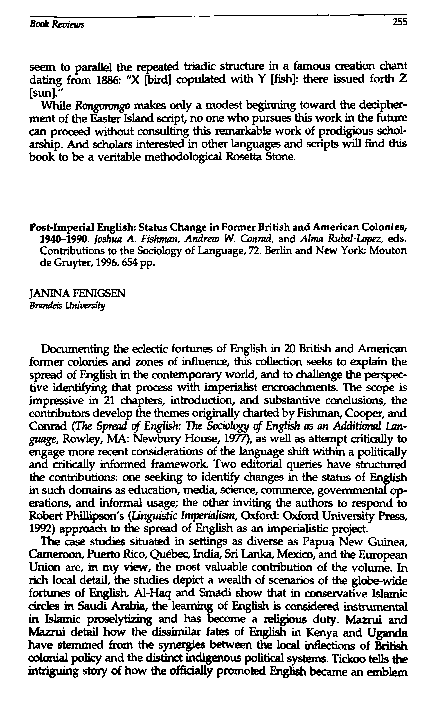Academia.edu no longer supports Internet Explorer.
To browse Academia.edu and the wider internet faster and more securely, please take a few seconds to upgrade your browser.
Post-Imperial English: Status Change in Former British and American Colonies, 1940-1990.:Post-Imperial English: Status Change in Former British and American Colonies, 1940-1990
Post-Imperial English: Status Change in Former British and American Colonies, 1940-1990.:Post-Imperial English: Status Change in Former British and American Colonies, 1940-1990
1998, Journal of Linguistic Anthropology
Related Papers
Journal of Linguistic Anthropology
Post‐Imperial English: Status Change In Former British and American Colonies, 1940‐19901998 •
Documenting the eclectic fortunes of English in 20 British and American former colonies and zones of influence, this collection seeks to explain the spread of English in the contemporary world, and to challenge the perspec-tive identifying that process with imperialist ...
2014 •
LINGUIST List 31.1553
An Extended Review: Kachru Braj. 2019. World Englishes and Culture Wars. Cambridge University Press.2020 •
The book "World Englishes and Culture Wars" is a novel collection of issues and concepts, past, present, and future that have (and will still continue to) shape intellectual debates and discussions about the narratives of the contentions in the history, development, and future of World Englishes, which, according to Kachru, are a metaphor for a window to see the fierce but subtle competition among the World Cultures to remain at or move from the periphery to the center. One veritable weapon to sustain the battle is to effectively and efficiently play the game of the politics of language, which in this book, is the politics of the English language, past, present, and the future. The fourteen chapters in the book are grouped into six sections representing World Englishes Today, Context and Creativity, Past and Prejudice, Ethical Issues and the ELT Empire, World Englishes and the Classroom, and Research Areas and Resources. The first section of the book consists of five chapters. Chapter 1, The Agony and Ecstasy discusses two different reactionary perceptions of the spread, uses and functions of the English language in the present global age. According to Kachru, there are two camps, whose attitudes, reactions, and perceptions of the spread and status of the English language can be identified as the agonising camp and the ecstasying camp. The agonising camp, such as Ngugi Wa Thiongo, agonises that the continued spread of the language is tantamount to the death of their local languages, cultures, identity, ideologies, and sensibilities, all of which sum up into the loss of future for the people and their societies. The ecstasying camp, according to Kachru, thus includes those who see nativisation and institutionalisation of English not only as liberation but as an opportunity to express and export to a global audience those cultural milieu, identities, and ideologies that the local languages had no opportunity to do. Also, the ecstasying camp rejoices at the opportunity to abandon the classical canon, and create a new canon which promotes and controls the ideological tenets of the society. Of course in this camp is the likes of Wole Soyinka, who won a Nobel Prize for Literature on a literary career exporting African (Yoruba) ideologies to a global audience via the English language (Akinlotan 2019b). Chapter 2 The Second Diaspora revisited how English language as colonial tool came to Africa, Asia, and beyond. The first diaspora is the spread of the language from Britain to the United States, Australia, New Zealand, and Canada. The Second Diaspora is characterised by expansion of the canon, a conscious creation of a distinct African and Asian canon, which means a repudiation of the shackles of canon from the colonial English. Moreso, a new linguistic order began to emerge in these places, such as the creation of form and meaning that are not shared with native speakers from the established varieties. The growth and development of English in the second diaspora has brought about different varieties in each country, which is often classified along 'an educated variety and a range of subvarieties'.
Journal of Multilingual and Multicultural Development
Empire of language: toward a critique of (post)colonial expression2014 •
RELATED PAPERS
CC The Journal: A Multidisciplinary Research Review
Mold Growth Prevention and Pest Control Practices as Sensible Steps to a Healthier School Environment2019 •
Beograd : Institut za filozofiju i društvenu teoriju eBooks
Zašto Holokaust i filozofija2018 •
Policromias (UFRJ)
ALEISTER CROWLEY NAS CANÇÕES DE BRUCE DICKINSON E IRON MAIDEN2023 •
https://www.meslekhastaligi.org/
İntihar ve beyin kanaması vakaları, kötü çalışma koşullarının göstergesi - Meslek Hastalığı - 20192019 •
Theory and Practice of Logic Programming
Learning Hybrid Algorithms for Vehicle Routing Problems2001 •
International Conference on Islamic Economic
Interrelation of Zakat Literacy, Social Behavior and Perceived Value on Intention of paying Zakat2024 •
Philosophy East and West
Striking Beauty: A Philosophical Look at the Asian Martial Arts by Barry Allen2018 •
Psikologia : Jurnal Psikologi
Difficulties In Understanding The Science Learning Material as Related to Educational PsychologyInternational Journal of Dentistry
In Vivo Assessment of Osseous Wound Healing Using a Novel Bone Putty Containing Lidocaine in the Surgical Management of Tooth Extractions2012 •
2017 •
Primeiros Escritos
O Estatuto da intencionalidade na obra A Transcendência do Ego, de Jean-Paul Sartre2020 •

 Janina Fenigsen
Janina Fenigsen